
The Scottish Government must give assurances that it will focus its spending on low-carbon projects as part of attempts to tackle the climate emergency, Holyrood’s Environment Committee has said.
Calling for assurances that the government will prioritise low carbon and carbon neutral projects across all departments’ spending, the committee adds that MSPs are “concerned” about the lack of detail in a key financial document.
While acknowledging the Scottish Government’s “strong commitment” to address the climate crisis by setting a net-zero emissions target by 2045, the report by the
Environment, Climate Change and Land Reform Committee warned that infrastructure projects should be chosen on the basis of their environmental impact.
The pre-budget scrutiny report states: “In the context of the climate emergency, the committee considers that Scotland needs to ‘lock in’ the transition to a zero-carbon future now.
“This will require a substantial shift in the proportion of investment that is spent on infrastructure that does not contribute negatively to climate change.”
Committee convenor Gillian Martin MSP said: “A climate emergency has been declared and Scotland has committed to reaching net-zero greenhouse gas emissions by 2045.
“To do this it is essential that the Scottish Government prioritises funding now for low carbon and carbon neutral action and ensures spending does not ‘lock in’ carbon emissions for years to come.
“We need to significantly step up to the climate and ecological crisis and make sure we increase our investment in natural capital, biodiversity and climate change action.
“There are huge opportunities for early action and significant potential costs of inaction or delayed action.”
Concerns were also raised about the failure of the government’s Medium Term Financial Strategy (MTFS) to include information about the carbon impact of projects getting funding, with the report stating: “The MTFS contains no detail on Scottish Government spending priorities or plans.”
The committee has previously called on the government to publish “an indication of the cumulative carbon impact” of its revenue and capital spending – something it is claimed did not happen in the latest report from May.
